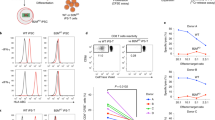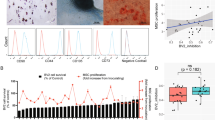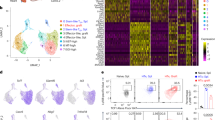Abstract
Embryonic stem cells (ESC) are suggested to be immune-privileged, but they carry the risk of uncontrolled expansion and malignancy. Upon differentiation they lose their tumor-forming capacity, but they become immunogenic by the expression of a normal set of MHC molecules. This immunogenicity might trigger rejection after application in regenerative therapies. In this study MHC expression of and immune responses to endothelial derivatives of rat embryonic stem cell-like cells (RESC) under inflammatory conditions were determined in comparison to primary rat aortic endothelial cells (ECs). Cellular as well as humoral allo-recognition was analyzed in vitro. In addition, immune reactions in vivo were assessed by allo-antibody production and determination of interferon-γ (IFNγ)-secreting allo-reactive T cells. RESC derivatives expressed low but significant levels of MHC class I, and no MHC class II. In response to IFNγ MHC class I expression was enhanced, while class II transactivator induction failed completely in these cells; MHC class II expression remained consistently absent. Functionally, the RESC derivatives showed a reduced allo-stimulatory capacity, protection against humoral allo-recognition in vitro and a slightly diminished susceptibility to cytotoxic T cell lysis. Furthermore, in vivo experiments demonstrated that these cells do not trigger host immune reactions, characterized by no allo-antibody production and no induction of allo-reactive memory T cells. Our results show that endothelial derivatives of RESC have a distinctive reduced immunogenic potency even under inflammatory conditions.
Similar content being viewed by others
Log in or create a free account to read this content
Gain free access to this article, as well as selected content from this journal and more on nature.com
or
References
Fandrich F, Lin X, Chai GX, et al. Preimplantation-stage stem cells induce long-term allogeneic graft acceptance without supplementary host conditioning. Nat Med 2002; 8:171–178.
Li L, Baroja ML, Majumdar A, et al. Human embryonic stem cells possess immune-privileged properties. Stem Cells 2004; 22:448–456.
Bonde S, Zavazava N . Immunogenicity and engraftment of mouse embryonic stem cells in allogeneic recipients. Stem Cells 2006; 24:2192–2201.
Kofidis T, deBruin JL, Tanaka M, et al. They are not stealthy in the heart: embryonic stem cells trigger cell infiltration, humoral and T-lymphocyte-based host immune response. Eur J Cardiothorac Surg 2005; 28:461–466.
Swijnenburg RJ, Tanaka M, Vogel H, et al. Embryonic stem cell immunogenicity increases upon differentiation after transplantation into ischemic myocardium. Circulation 2005; 112 Suppl:I166–I172.
Pettigrew GJ, Bolton EM, Bradley JA . Alloantigen recognition pathways and transplant tolerance. Transplant Proc 2001; 33:3811–3813.
Rogers NJ, Lechler RI . Allorecognition. Am J Transplant 2001; 1:97–102.
Choo JK, Seebach JD, Nickeleit V, et al. Species differences in the expression of major histocompatibility complex class II antigens on coronary artery endothelium: implications for cell-mediated xenoreactivity. Transplantation 1997; 64:1315–1322.
Pober JS . Immunobiology of human vascular endothelium. Immunol Res 1999; 19:225–232.
Collins T, Korman AJ, Wake CT, et al. Immune interferon activates multiple class II major histocompatibility complex genes and the associated invariant chain gene in human endothelial cells and dermal fibroblasts. Proc Natl Acad Sci USA 1984; 81:4917–4921.
Hidalgo LG, Halloran PF . Role of IFN-gamma in allograft rejection. Crit Rev Immunol 2002; 22:317–349.
Vos IH, Briscoe DM . Endothelial injury: cause and effect of alloimmune inflammation. Transplant Infect Dis 2002; 4:152–159.
Ferry B, Halttunen J, Leszczynski D, Schellekens H, vd Meide PH, Hayry P . Impact of class II major histocompatibility complex antigen expression on the immunogenic potential of isolated rat vascular endothelial cells. Transplantation 1987; 44:499–503.
Ruhnke M, Ungefroren H, Zehle G, Bader M, Kremer B, Fandrich F . Long-term culture and differentiation of rat embryonic stem cell-like cells into neuronal, glial, endothelial, and hepatic lineages. Stem Cells 2003; 21:428–436.
Vassilieva S, Guan K, Pich U, Wobus AM . Establishment of SSEA-1- and Oct-4-expressing rat embryonic stem-like cell lines and effects of cytokines of the IL-6 family on clonal growth. Exp Cell Res 2000; 258:361–373.
Wobus AM, Boheler KR . Embryonic stem cells: prospects for developmental biology and cell therapy. Physiol Rev 2005; 85:635–678.
Prelle K, Vassiliev IM, Vassilieva SG, Wolf E, Wobus AM . Establishment of pluripotent cell lines from vertebrate species--present status and future prospects. Cells Tissues Organs 1999; 165:220–236.
Bordenave L, Fernandez P, Remy-Zolghadri M, Villars S, Daculsi R, Midy D . In vitro endothelialized ePTFE prostheses: clinical update 20 years after the first realization. Clin Hemorheol Microcirc 2005; 33:227–234.
Benichou G, Valujskikh A, Heeger PS . Contributions of direct and indirect T cell alloreactivity during allograft rejection in mice. J Immunol 1999; 162:352–358.
Jiang S, Herrera O, Lechler RI . New spectrum of allorecognition pathways: implications for graft rejection and transplantation tolerance. Curr Opin Immunol 2004; 16:550–557.
Dye JF, Jablenska R, Donnelly JL, et al. Phenotype of the endothelium in the human term placenta. Placenta 2001; 22:32–43.
Drukker M, Benvenisty N . The immunogenicity of human embryonic stem-derived cells. Trends Biotechnol 2004; 22:136–141.
Drukker M, Katz G, Urbach A, et al. Characterization of the expression of MHC proteins in human embryonic stem cells. Proc Natl Acad Sci USA 2002; 99:9864–9869.
Drukker M, Katchman H, Katz G, et al. Human embryonic stem cells and their differentiated derivatives are less susceptible to immune rejection than adult cells. Stem Cells 2006; 24:221–229.
Holtz R, Choi JC, Petroff MG, Piskurich JF, Murphy SP . Class II transactivator (CIITA) promoter methylation does not correlate with silencing of CIITA transcription in trophoblasts. Biol Reprod 2003; 69:915–924.
Miller DM, Rahill BM, Boss JM, et al. Human cytomegalovirus inhibits major histocompatibility complex class II expression by disruption of the Jak/Stat pathway. J Exp Med 1998; 187:675–683.
Chang CH, Flavell RA . Class II transactivator regulates the expression of multiple genes involved in antigen presentation. J Exp Med 1995; 181:765–767.
Sims TN, Afrouzian M, Urmson J, Zhu LF, Halloran PF . The role of the class II transactivator (CIITA) in MHC class I and II regulation and graft rejection in kidney. Am J Transplant 2001; 1:211–221.
Yun S, Rose ML, Fabre JW . The induction of major histocompatibility complex class II expression is sufficient for the direct activation of human CD4+ T cells by porcine vascular endothelial cells. Transplantation 2000; 69:940–944.
Liu H, Kemeny DM, Heng BC, Ouyang HW, Melendez AJ, Cao T . The immunogenicity and immunomodulatory function of osteogenic cells differentiated from mesenchymal stem cells. J Immunol 2006; 176:2864–2871.
Nicosia RF, Villaschi S, Smith M . Isolation and characterization of vasoformative endothelial cells from the rat aorta. In Vitro Cell Dev Biol Anim 1994; 30A:394–399.
Acknowledgements
We would like to thank Mrs Winkler (Max-Delbrück Center for Molecular Medicine, Berlin, D) for her technical assistance in regard to the RESC culture and Elke Effenberger and Sabine Brösel for their excellent technical support. We gratefully acknowledge Dr Ana-Luisa Pina (Berlin-Brandenburg Center for Regenerative Therapies, BCRT) for her critical revision of the manuscript. The project was supported by the BCRT (BMBF funded) and a Charité grant.
Author information
Authors and Affiliations
Corresponding author
Rights and permissions
About this article
Cite this article
Ladhoff, J., Bader, M., Brösell, S. et al. Low immunogenicity of endothelial derivatives from rat embryonic stem cell-like cells. Cell Res 19, 507–518 (2009). https://doi.org/10.1038/cr.2009.21
Received:
Revised:
Accepted:
Published:
Issue date:
DOI: https://doi.org/10.1038/cr.2009.21
Keywords
This article is cited by
-
Immunological Barriers to Stem-Cell Based Cardiac Repair
Stem Cell Reviews and Reports (2011)
-
Meet the inlaws: Embryonic stem cell derivatives meet the immune system
Cell Research (2009)



